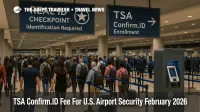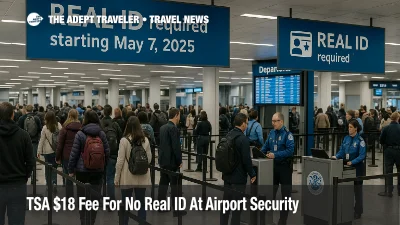REAL ID
The implementation of the REAL ID Act has introduced significant changes in how Americans travel domestically. The REAL ID, which stands for "Real Identification," aims to enhance security requirements for state-issued identification cards and driver's licenses. Travel regulations have evolved in response to threats, necessitating better identification and verification processes.
REAL ID compliance affects individuals traveling within the United States. As of the most recent updates, travelers must present a REAL ID-compliant driver's license or other acceptable forms of identification to board domestic flights. Ensuring your identification meets these standards is crucial to avoid disruptions during travel.
Understanding REAL ID
The REAL ID Act was passed by Congress in 2005 as a post-9/11 security measure. It is designed to establish minimum security standards for states issuing licenses and identification cards to prevent fraudulent issuance. A REAL ID-compliant card typically has a star mark at the top of the card, indicating compliance with federal standards.
To obtain a REAL ID, individuals typically need to visit their state's Department of Motor Vehicles (DMV) and provide several documents, such as proof of identity, proof of social security number, and two proofs of residency. Each state may have specific requirements, so it's essential to check with your local DMV for the exact documents needed.
How REAL ID Impacts Travel
The primary way REAL ID impacts travel is by setting a higher standard for identification at airport security checkpoints. Starting from the designated enforcement date, travelers without a REAL ID-compliant driver's license or other accepted forms of identification won't be allowed through Transportation Security Administration (TSA) checkpoints. It's imperative to prepare in advance, especially as the enforcement deadline approaches.
Other acceptable forms of identification include passports, passport cards, military IDs, and other TSA-approved IDs. Planning your travel around this requirement ensures a smoother experience at the airport and helps avoid delays or additional scrutiny from security personnel.
REAL ID Application Process
Applying for a REAL ID is a straightforward process but requires preparation. Gather the necessary documents ahead of time to meet your state's DMV requirements. You will need to provide documentation proving your identity, social security number, and residency. These might include a valid passport, social security card, and utility bills or bank statements.
Visit your state's DMV website to verify which documents are acceptable. Once you have the required documents, make an appointment at the DMV, if possible, to reduce waiting times. The DMV will process your application, take your photograph, and issue your REAL ID. Note that fees may apply, varying by state.
Traveling with REAL ID
When traveling with a REAL ID, the process at the airport remains largely the same. Present your REAL ID at the TSA checkpoint, and it will be scanned and verified just like any other form of identification. Ensure you keep your REAL ID secure and accessible during your travels. Having a REAL ID simplifies the travel experience by meeting federal requirements for ID verification.
If you do not have a REAL ID by the enforcement date, you must use an alternative form of identification. Always check TSA guidelines for the latest accepted IDs to ensure compliance and avoid unnecessary delays. Remember, international travel requires a passport, regardless of whether you have a REAL ID.
Benefits of REAL ID
REAL ID provides several benefits, mainly centered around enhanced security and standardization. By setting uniform standards for identification across all states, the REAL ID reduces the risk of identity fraud and improves overall security. This uniformity ensures TSA agents can quickly and efficiently verify identities, streamlining the travel process.
For frequent travelers, having a REAL ID eliminates the need to carry additional forms of identification for domestic flights. A single, compliant driver's license suffices, making travel preparation more straightforward. The enhanced security features embedded in REAL ID-compliant cards also deter counterfeiters, adding another layer of protection against identity theft.
Common Misconceptions about REAL ID
There are several misconceptions about the REAL ID that need clarification. First, the REAL ID is not a national ID card or a federal database. It is a state-issued driver's license or identification card that meets specific federal standards. Each state retains control over the issuance of these IDs, although they must adhere to the guidelines set by the REAL ID Act.
Another misconception is that having a REAL ID is mandatory for everyone. While it's required for air travel and access to certain federal facilities, not everyone needs to obtain a REAL ID. Individuals who do not fly or need access to these facilities may choose to retain their standard driver's license or ID. However, for most travelers, obtaining a REAL ID is a practical step to ensure compliance with federal travel regulations.
Future of REAL ID and Travel
The REAL ID Act represents a significant step forward in securing domestic travel. As enforcement of the REAL ID requirements becomes more prevalent, travelers and state DMVs are likely to experience a smoother transition. Continuous updates and improvements to the REAL ID program may arise as technology and security needs evolve.
Keeping abreast of changes related to REAL ID enforcement and travel requirements is vital. Staying informed helps travelers prepare adequately and reduces the stress associated with last-minute changes. As policies adapt, ensuring your identification meets all requirements is essential for hassle-free travel experiences.
In the coming years, the landscape of travel will continue to evolve with security at the forefront. REAL ID is just one component of a broader strategy to enhance safety and streamline identification processes. Adapting to these changes by staying knowledgeable and prepared will help ensure a seamless travel experience.
The introduction of the REAL ID Act and its implications for travel mark a significant shift in how identification is handled in the United States. By understanding the requirements and benefits of REAL ID, travelers can better navigate the complexities of modern travel while contributing to a safer and more secure travel environment.
TSA ConfirmID U.S. Airport ID Fee Starts Feb 2026

TSA ConfirmID Fee For Flights Starts Feb 1, 2026

TSA Confirm.ID Fee For U.S. Airport Security February 2026

TSA $18 Fee For No Real ID At Airport Security

REAL ID and Travel: Everything You Need to Know

TSA Extends REAL ID Deadline and Expands Digital ID Use

REAL ID Enforcement Delays Again: What Travelers Should Know

Travel News: REAL ID Deadline, France Bans Flights, and TSA Expand Facial Recognition

REAL-ID, Alaska Airlines & Lyft, and Pilot Strikes

Travel News: REAL ID Deadline, the Return of Oktoberfest, and a COVID Update from Greece

